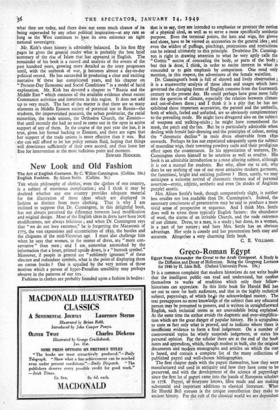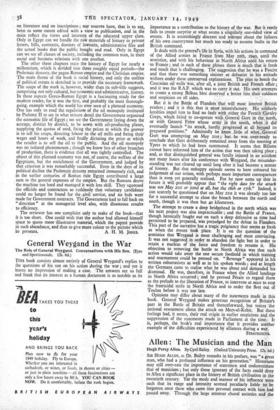Greco-Roman Egypt
Egypt from Alexander the Great to the Arab Conquest. A Study in the Diffusion and Decay of Hellenism. Being the Gregynog Lectures for 1946 by H. Idris Bell. (Oxford University Press. 10s.)
IT is a common complaint that modern historians do not write books that the intelligent public can read and understand, but confine themselves to works of erudition which only their fellow- historians can appreciate. In this little book Sir Harold Bell has set out to cater for both audiences, and that in the highly technical subject, papyrology, of which hegis the acknowledged master. The text presupposes no more knowledge of the subject than any educated person may be presumed to possess, and is written in straightforward English, such technical terms as are unavoidable being explained. At the same time the author avoids the dogmatic and over-simplifica- tion which are the great danger of popular history. He is scrupulous to state as fact only what is proved, and to indicate where there is insufficient evidence to form a final judgement. On a number of controversial topics he . wisely suspends judgement, or states his personal opinion. For the scholar there are at the end of the book notes and appendices, which, though modest in bulk, cite the original documents and modern monographs and articles on which the text is based, and contain a complete list of the many collections of published papyri and well-chosen bibliographies.
The first chapter deals with the papyri themselves, how they were manufactured and used in antiquity and how they have come to be preserved, and with the development of the science of papyrology since the first lot of papyri came into the hands of European scholars in 1778. Papyri, asf everyone knows, hive made and are making substantial and important additions to classical literature. What Sir Harold Bell stresses is the unique contribution they make to ancient history. For the cult of the classical world we are dependent on literature and on inscriptions ; our sources have, that is to say, been to some extent edited with a view to publication, and in the main reflect the views and interests of the educated upper class. Only in Egypt can we handle the raw materials of history in private letters, bills, contracts, dossiers of lawsuits, administrative files and the actual books that the public bought and read. Only in Egypt can we see all classes of society, including the common man, in their social and business relations with one another.
The other three chapters trace the history of Egypt for nearly a millennium, which is divided into three roughly equal periods—the Ptolemaic dynasty, the pagan Roman empire and the Christian empire. The main theme of the book is social history, and only the outline of political events is sketched in to provide the necessary framework. The scope of the work is, however, wider than its sub-title suggests, comprising not only cultural, but economic and administrative, history. In these aspects Greco-Roman Egypt is a fascinating study for the modern reader, for it was the first, and probably the most thorough- going, example which the world has ever seen of a planned economy. One has only to read the regulations of the oil monopoly instituted by Ptolemy II to see in what minute detail the Government organised the economic life of Egypt ; we see the Government laying down the acreage, district by district, to be sown. with oil-producing plants, supplying the quotas of seed, fixing the prices at which the grower is to sell his crops, directing labour to the oil mills and fixing their' wages and hours of work, and finally dictating the price at which the retailer is to sell the oil to the public. And the oil monopoly was no isolated phenomenon ; though we know less of other branches of production, there is evidence that all was tightly controlled. The object of this planned economy was not, of course, the welfare of the Egyptians, but the enrichment of the Government, and judged by that criterion it was remarkably successful. Even in the days of its. political decline the Ptolemaic dynasty remained immensely rich, and in the earlier centuries of Roman rule Egypt contributed a large sum to the general expenses of the empire. But the Romans drove the machine too hard and managed it with less skill. They squeezed the officials and contractors so ruthlessly that voluntary candidates could no longer be found for the_ civil service, and no bids were' made for Government contracts. The Government had to fall back on " direction " at the managerial level also, with disastrous results to efficiency.
The reviewer has one complaint only to make of the book—that it is too short. One could wish that the author had allowed himself space to quote more 'illustrative material, which the papyri provide in such abundance, and thus to give more colour to the picture which



































 Previous page
Previous page